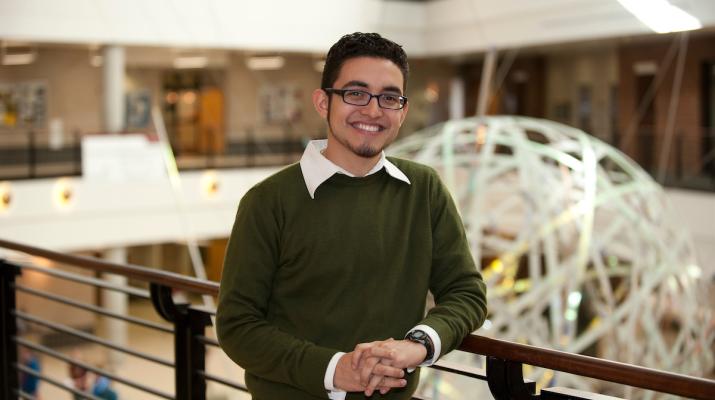
First-Hand Knowledge
Thursday, April 1, 2010
This was an amazing opportunity to learn about the international supply chain and the importance of using local expertise in foreign markets.
FIRST-HAND KNOWLEDGE—The Carlson School’s live case projects allow students to experience how business is done around the globe.
International business courses are an integral part of today’s curriculum. But there are limits on how much students can learn about cultural differences in business practices without actually experiencing them. Through live case projects, Carlson School students experience these differences first-hand while working on a business case for an international company.
Part-Time MBA student Anne Haddad says the live cases combine the experiences of both a business course and an education abroad program. Haddad, the owner of a Twin Cities consulting firm for nonprofit organizations, was one of 25 Carlson School MBA students who traveled to Guangzhou, China, in January 2010 to work on a competitive analysis project for computer maker Lenovo. During the study, the students assessed the strengths and weaknesses of Lenovo competitors that use original design manufacturers and contract manufacturers.
Before traveling to China, the MBA students participated in conference calls with Lenovo executives to familiarize themselves with the corporate strategies and issues they would explore. After arriving in China, they met their MBA counterparts from Lingnan (University) College at Sun Yat-sen University; visited original design manufacturers, suppliers and factories; and toured Lenovo facilities. In a final presentation, Carlson School and Lingnan students showcased their recommended changes to Lenovo leaders.
“It was an eye-opening experience to work with our Chinese counterparts, learn about local customs, and experience how businesses deal with suppliers,” says Haddad. “For example, when negotiating contracts, the local business people emphasized ‘Guanxi,’ a term for the importance of personal connections and relationships. This was an amazing opportunity to learn about the international supply chain and the importance of using local expertise in

When you go abroad you are not only learning about what is in a textbook or classroom but about culture and yourself.
WIN-WIN FOR EVERYONE
More than 450 graduate and undergraduate students have participated in live case projects since 1996. The live cases, which are held in Austria, China, and Central and Eastern Europe, capitalize on the Carlson School’s relationships with alumni, corporations, and its Board of Overseers. “The live case projects are a win-win for everyone involved,” says Anne D’Angelo King, the Carlson School’s assistant dean of international programs. “Students gain hands-on experiences working in multicultural teams for businesses operating in international markets, as well as insights into the business practices of specific countries and regions. Companies benefit from the targeted attention of 20 to 40 MBA students from the Carlson School and a local partner business school on projects or problems of real import to their businesses.”
Vince Ruiz-Ponce, a senior graduating in May 2010 with a BSB degree in marketing and international business, experienced those benefits first-hand during a live case project for Cargill in Warsaw, Poland, that involved assessing the expansion opportunities for the company’s pet food division in Central and Eastern Europe. The analysis considered marketing, distribution and logistics, finances, market potential, and the competitive landscape in these markets. After beginning work on the case at the Carlson School, student teams toured Cargill facilities in Minnesota, rural Poland, and Hungary before presenting their final reports to Cargill executives in Warsaw.
Ruiz-Ponce says the live case project was a great opportunity to work with a large international company and observe the business market in Europe. “It was amazing to see the scale of a large company like Cargill and find out how it modifies products and services to meet the needs of different communities,” he notes, adding that working with partner school students was one of the highlights of the trip. “Interacting with students in formal and informal settings allowed us to learn about Polish culture and understand its subtleties. I learned a lot about international relations, laws, customs, and what pet owners feed their dogs and cats in different countries. When you go abroad you are not only learning about what is in a textbook or classroom, but about culture and yourself. ”
FROM CAKES TO GOLF COURSES
In addition to Cargill and Lenovo, International Dairy Queen and Toro also serve as partner companies for live case projects. In 2008, students assessed overall marketing opportunities for International Dairy Queen in China. In 2009, a live case project with partner students at Cheung Kong Graduate School of Business focused on strategies for increasing sales of Dairy Queen cakes in Shanghai, China. That same year, another group of students traveled to Guangzhou and Shanghai to team up with Lingnan (University) College students and assess the service levels provided by Toro distributors to turf maintenance equipment customers at golf courses. In 2010, Carlson School students will travel to Austria and Poland to study strategies for boosting sales of Toro’s commercial ground equipment in Central and Eastern Europe.
The live case projects are only one option among many diverse international opportunities available to Carlson School students. Thanks to recent curriculum changes, all undergraduate, Part-Time and Full-Time MBA students, and Executive MBA students are now required to complete an international experience for graduation. D’Angelo King says that the students benefit from these developmental experiences that build a foundation for global competence. “By exposing students to the varied viewpoints of international corporations, foreign markets, and global students, they broaden their multicultural perspectives on a personal and professional level,” she says. “The value of a first-hand, personal experience with another culture cannot be underestimated.”